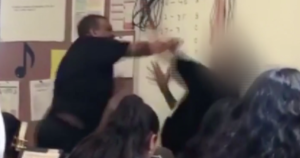COVID-19 Pandemic Exposes Media’s Failure to Cover LGBTQ+ Stories
May 1, 2020
One group that has been significantly affected by the COVID-19 pandemic is the LGBTQ+ community. In Uganda, the government used alleged violations of social distancing guidelines to raid an LGBT shelter, and arrest 20 people. In Morocco, a country where homosexuality is still criminalized, a transgender model used her instagram platform to encourage followers to create fake accounts on gay dating apps, and out people on them — something that can, and has led to violence and de jure discrimination. In Puerto Rico, a string of murders has claimed the lives of at least five transgender people in the past two months.
One other major pervasive piece of rhetoric during the pandemic: that COVID-19 is the fault of the acceptance of LGBTQ+ individuals. In Florida, a police chief said that a deputy’s death from the virus was caused by his “homosexual” lifestyle. The Bible teacher of president Donald Trump’s cabinet blamed several groups for the virus, including those who have “a proclivity towards lesbianism and homosexuality.” Pastor Steven Andrews said that, “God’s love shows it is urgent to repent, because the Bible teaches homosexuals lose their souls and God destroys LGBT societies. Obeying God protects the USA from diseases, such as Coronavirus.” He also declared march, “Repent of LGBT sin month.”
Circumstances caused by this virus has allowed some issues that still plague the LGBTQ+ community to enter even the fringes of the political discourse, which has been a rarity since the legalization of same sex marriage in Obergefell v. Hodges in 2015, but it has also highlighted the severe lack of coverage of issues involving the LGBTQ+ community since Obergefell v. Hodges as the sudden abundance of stories involving the community have still struggled to even reach the edge of relevance. The aforementioned story from Morocco had originally started weeks before the first mainstream articles were published, whose publication only occurred after instagram took down her account after weeks of LGBTQ+ people on social media encouraging followers to report her account. The news stories came weeks too late.
The Ugandan crackdown, the string of murders in Puerto Rico, a policy revision by the Trump administration which would allow hospitals to refuse care to LGBTQ+ patients, the milestone of a third of Poland being declared a “gay-free zone” as of February and the continued advancement of a law that criminalizes teaching LGBTQ+ topics in schools in Poland have all received little press coverage outside of small, fringe outlets. Even as close to home as Missouri, this lack of coverage has been apparent. During the 2020 legislative session, a host of legislation designed to curb LGBTQ+ rights were proposed in the General Assembly, and yet the proposed bills received almost no coverage. Legislation throughout other state legislatures similar to the legislation in Missouri which, different to the legislation in Missouri, passed also received almost no coverage, including a bill in Tennessee which allowed for adoption agencies who receive taxpayer funds to refuse gay and lesbian couples because of their sexuality.
For years, the media has failed to report these occurrences except in rare circumstances where the story could be sensationalized. Politicians mention LGBTQ+ people in brief asides, but with the exception of a select few politicians, who are mostly in the community themselves, have actually made a point of advocating for legislation that would benefit the community. Where was the coverage of the oral arguments in the Supreme Court cases involving discrimination in employment for LGBTQ+ employees? What happened to the section of the CNN website which existed for a mere week with LGBTQ+ related stories before the Equality Townhall once the town hall had ended? Where was the coverage of a lesbian couple’s house which was vandalized not but a week ago? What about the new anti-transgender Idaho laws, or the anti-transgender legislation likely to pass in Hungary? Where was the coverage of the Southern Poverty Law Center’s (SPLC) report on major growth of anti-LGBTQ+ organizations in 2019, whose massive growth was shown even despite the extremely restrictive definition used by the SPLC which stated, “Viewing being LGBTQ as unbiblical or simply opposing marriage equality does not qualify an organization to be listed as an anti-LGBTQ hate group?”
This pervasive lack of reporting on these issues also allows those who push these policies to escape without their actions being shown to the public at all in what is an abdication of responsibility by the media, whose job is supposed to check the government in the first place. By failing to cover these topics, journalists allow the continuation of discriminatory practices, the continued enactment of homophobic and transphobic laws and the continued advancement of the point of view of LGBTQ+ people being a mature topic, or a topic unsuitable for children even when gay couples are presented the same as heterosexual couples. All of this is promoted by the lack of reporting because of the media’s major role in setting the public agenda — if a topic doesn’t get media attention, then it doesn’t get attention in the public, and that issue, in this case the issues surrounding the LGBTQ+ community, goes unresolved and often degrades.
How can the view that gay people are unsuitable to be shown to children, or that there are no more issues facing the LGBTQ+ community, at least in America, or a whole host of other misconceptions surrounding the LGBTQ+ community be tackled without exposure? The answer is it can’t, which is why this lack of media coverage is so pervasive. Even in the Wentzville School District this concept of gay topics, or people in general being unsuitable for schools is demonstrated by school board member Sandy Garber who wrote on Facebook in June of 2019 that, “there is no place in schools for hte education of sex orientation or social contributions by the LGBT community.” If the media refuses to cover LGBTQ+ topics, except on the rare occurance of them using it for expediency, like the CNN Equality Townhall which was marketed as the first time LGBTQ+ topics were directly addressed in a town hall by presidential candidates, then these sorts of false, yet still extremely widely held views about the LGBTQ+ community would be addressed during the ensuing conversations that would occur if the community was even brought to the fringe of the public agenda.
The COVID-19 pandemic has lead to a whole new host of stories surrounding the LGBTQ+ community as governments continue to expand their discriminatory policies in a year that has already seen a whole host of anti-transgender, and anti-gay legislation enacted across the United States, and across the world. Despite this whole host of stories in just April and March, but also throughout the entire year, and in years prior, the media has failed to provide any major coverage to any of these stories except when it is expedient to that outlet. This suppression of stories guarantees the preservation of a whole host of misconceptions, or wrongly-held beliefs that guarantees the continued existence of de jure and de facto discrimination against LGBTQ+ people in what is a demonstration of an abdication of journalistic responsibility on the part of reporters who fail to cover even the large stories like Supreme Court cases, large amounts of state-level legistion, the enactment of disciminitory laws in other countries, like Poland and Hungary and a whole host of other laws and occurrances that have been listed throughout this article. The media needs to alter the mindset which refuses to cover these stories and reverse course in what will likely be a crucial year for LGBTQ+ rights worldwide as countries and states move with great rapidity to suppress the community through legislation often including criminal statutes.



